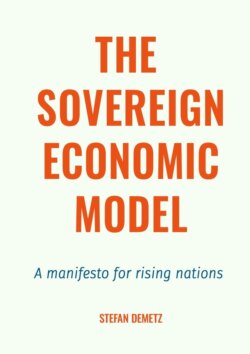Читать книгу The Sovereign Economic Model. A manifesto for rising nations - Stefan Demetz - Страница 27
Economic infrastructure
ОглавлениеSovereign Strategic Business Infrastructure
Business infrastructure includes all the companies that enable the country and economy to function and that drive the main economic activities. Business infrastructure comprises both government agencies and privately run core systemic companies. The core economic sectorial companies needed to run an economy are energy, telecom, transport, and banking. Additionally, the health care and food industries are vital to a country’s citizens. The same might apply to other industries, which provide large-scale employment to the local population. It lies therefore, in the interests of a country to control such companies. Types of economic infrastructure facilities are the following:
• Utilities
• Energy
• Telecom
• Financial
• Financial institutions and payment systems
• Transport and logistics for people and goods
• Media
Utilities are most often monopolies, as building distinct instances of infrastructure is almost impossible from a financial point of view. So the base infrastructure, such as the electric grid and gas and water networks should belong to the state. Market actors can provide a variety of connectivity services as well as last-mile sales and services to end consumers. Utilities are massive companies with billions in revenue and can often generate large profits. They additionally require significant investment for upkeep and new infrastructure. They require underlying technologies with medium to high complexity, which are excellent business and provide high-value wealth creation for local industries and the domestic economy.
Energy is the most important enabler of cheap economic activity. Therefore, all businesses in the energy market sector should belong to the state. The rationale is to provide the population and business with the best mix of energy at convenient prices. Energy business should limit profit-taking to pass on savings to the economy. Or it should reinvest profits into other wealth creation industries, like capital tools and technologies, for the industry itself. Endless opportunities are available in mining, oil and gas extraction, transport, storage, power generation, and renewable energy technologies to add more R&D and innovation. Otherwise, only investments to build additional capacity and power stations to sell excess energy to foreign countries are alternative options.
The concept for the telecom sector should be identical. At least 51 percent of the physical infrastructure network should belong to the state, with market actors owning the rest. In the telecom context, state ownership can guarantee tighter national security and consumer privacy than private companies. Also, procurement decisions regarding equipment and suppliers are made centrally to manage costs and integration more accurately. The ownership of telecom companies can therefore be useful for building domestic technologies and to supply them with 4G or 5G equipment. That would start a new industry with a high level of value creation and manufacturing of medium-to-high-tech communication equipment and devices.
Banks are the foundation of all transactions for an economy. Payments are made via bank accounts of commercial entities while connected mostly via cards and payment systems between two parties in consumer transactions. A sovereign country should not only control the money via its Central Bank and regulators, but also have a significant stake in the system for stricter direct control. For systemic banks, the government should have the majority of shares or at least a golden share to veto some business practices. Payment systems, as in cards or other mechanisms, should likewise be under firm government control. In the best-case scenario, they should be local implementations instead of belonging to private hands or foreign corporations.
Media is not part of the business infrastructure per se, but is more of a government loudspeaker on the economy itself. So a government should have control of its media directly by ownership or regulation, or media should be a government-aligned business.
Transport and logistics are an important part of the business infrastructure because they move people and goods. Ports, railways, and airports are key facilities. As an economic sector in its own right, transport and logistics can give a boost to these infrastructure investments. This can foster industrial development of machinery, equipment, and industrial tools for various industries, from vehicles to tools and machines. Transport and logistics offer a high potential for automation and optimization by applying many technologies such as robotics, AI, and Big Data.
Any monopoly or rent-seeking business, if it is an unavoidable component of national economic development, should belong to the state. Then the state can run it as a state-owned enterprise and balance profits and services at the lowest cost possible for the population. That is the mindset in Europe for the health care industry, in which most essential services are free or cost only a symbolic fee. Alternatively, the state uses profits from monopoly state-owned corporations to provide free or subsidized services to society.
Specifically, control over all or most of the mentioned industries allows a government to further condition much of the economy and retain a big part of economic sovereignty. This gives it the strength required to impose additional economic policies beneficial to the country and its citizens. Despite state control of the business infrastructure, long-term well-defined strategic plans can also help private business to co-invest and build large value-added services on top of these industries.
